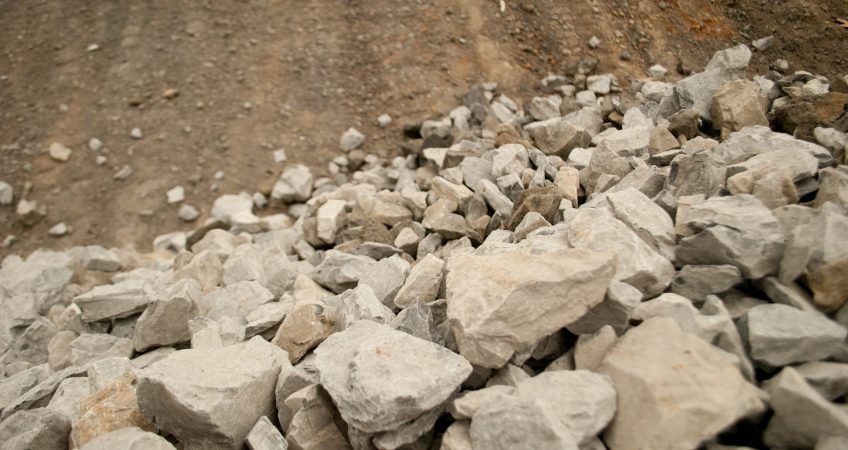Carpet, laminate or tile? Siding, stone, or stucco? Grass, patio or flowerbeds? Homeowners are often considering how they want a finished project to look, feel, and function. But what about your driveway, lane, or private road? Are you happy with its appearance? Are you satisfied with its functionality? Or do you find that each season of the year presents unrelenting challenges related to how you access your home? Here is a simple guide to understand the aggregate (i.e. materials) available to homeowners for the construction and maintenance of their private drives.
Slate
Slate, also called shale, is a brittle type of rock which is commonly used for the construction of a driveway, lane, or private roadway. Slate can be placed on to bare dirt to level and shape the grade of the driveway. Due to its brittleness, it easily packs together merely from the force of driving over it with equipment and vehicles. This quality creates a firm, dense road base which pushes down into the dirt beneath it. Once this base is established, other types of aggregate such as crushed stone can be placed on top of the slate. There are times when adding slate to an established unpaved road may help resolve issues which have developed from poor construction and/or minimal maintenance.
2B Stone/Limestone
There are various types of crushed stone used in the construction and maintenance of an unpaved drives. 2B stones have been crushed into pieces that are approximately 1-2” in size. This crushed stone is then cleaned or washed to remove all of the debris created during the process of being crushed to size. This type of stone is ideal for facilitating drainage and can be used to construct or maintain your lane. 2B stone is also useful to ‘bridge over’ areas which are prone to standing water or moisture retention. The color of crushed stone will vary depending on your location. If there is a specific shade that you would like to see in your driveway, such as red stone, ask your excavator or local quarry if it can be obtained in your region.
2A-Modified/Limestone
Like 2B stones, 2A-Modified have been crushed to approximately 1-2” in size. However, the dirt created from this process has not be removed or washed from the stone. Because this debris remains with the stone, it serves as an excellent choice for packing into your private road. This stone will become dense on your roadway and with the proper construction of your driveway, (read Tips for a Well-Built Driveway) 2As will remain in place for a long time once they have been compacted.
Fine Washed Stone/Limestone
Some home owners prefer to use a finely crushed gravel stone for their driveway. This is generally a stone that is 1\2” in size and washed clean of all dust and dirt. It can produce a more trim and finished appearance and is also more tolerable to walk on if you like being barefoot. Additionally, it is a good option for homeowners who may have horses or other animals who use their lane. Finely crushed stone should be laid after a firm base for the drive has been established. On the downside, this stone is more likely to get caught in tread on shoes and hitch a ride on to other surfaces or into your house.
Road millings & Recycled Materials
Road millings are a type of recycled construction material that packs nicely on to unpaved roads and provide a smooth driving surface. Millings are created when a public paved road surface or parking lot is ground off so that it can be replaced. Unlike limestone, recycled material are not mined so your local quarry may not retail it. You will want to contact your excavator or hardscape supplier to see if they have access to recycled construction material such as road millings.
Wood Chips/Mulch
Wood chips can seem like an inexpensive and plentiful alternative in construction of a driveway compared to using slate or stone; however, there are many potential issues with using this material that lead to a low quality (and at times, impassable) road. Wood chips and mulch retain moisture and rain water, which causes it to rot quickly one year to the next. This rotting material will create a soft road bed and will not provide good winter traction. In addition, the soft, water logged base will easily wash away in places where rainwater is flowing downhill. Other issues we have encountered with homeowner’s who have used this product include: insect infestations, difficult snow removal, and growth of vegetation. Eventually, many homeowners who have used wood chips or mulch have chosen to have the material replaced with an alternative that will provide a firm structure, good drainage, and easy winter maintenance.
Dig in and get it done.
A dirt road left bare will create numerous headaches and obstacles. Bare roadways become muddy and slick during excessively wet periods, or when frozen ground thaws in the early spring. They are also prone to developing ruts which will accelerate the rate at which rain water will be able to damage your driveway. Above all else – when the rain and snow isn’t falling on your dirt driveway, you will find that it creates an enormous amount of dust. At the very least, it is best to develop a slate base for your driveway, lane, or private road. Many excavators have access to slate pits where they are able to affordably obtain the material for delivery and use on your private road. Your excavator will also be able to obtain refined quarry material, such as crushed limestone, for use on your property.
E.B. Excavating, LLC can deliver and spread these products and more, helping you add the driveway to your list of completed, quality projects. Call our experienced staff to receive reliable, friendly assistance and expert guidance for improving your driveway. It’s our priority to make sure your driveway is both well-constructed and properly maintained.

